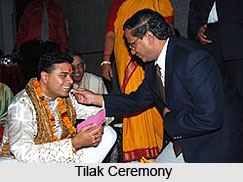 Among the pre wedding functions of Indian wedding, tilak ceremony holds an important position. The Tilak ceremony is performed in most of the families according to the tradition and culture of that particular caste. The ceremony is held in different styles according to different traditions and caste.
Among the pre wedding functions of Indian wedding, tilak ceremony holds an important position. The Tilak ceremony is performed in most of the families according to the tradition and culture of that particular caste. The ceremony is held in different styles according to different traditions and caste.
Mostly the tilak ceremony is held at the groom`s residence or at some revered temple and in Sikh religion the ceremony is performed by a preacher or bhaiji from the Gurudwara who first recites the hymn and after that offers the groom a date and puts the tilak or tika on his forehead, marking the engagement. That`s why it is known as a tilak ceremony. After all the rituals the bride`s father offers gifts to the groom and his family members. The gifts may include clothes, fruits, sweets, and other items for the groom and his family members. Following the ceremony, the groom`s father sends gifts of sugar, jewelry, coconut, rice, clothes and henna to the bride. Friends and relatives from the groom`s family carry those gifts for the bride and her family members.
The tilak ceremony is conducted mainly at the groom`s residence because according to the Hindu custom only the groom is eligible for the tilak ceremony; it is only for the boy and not for the girl. However, gifts are exchanged between both the families. In some caste it is called the Chenkai Ceremony. In India, the bridegroom and his family stand in the higher status. Therefore, after they get ready for the wedding the first ceremony that sanctifies the seal of marriage is Tilak ceremony.
Usually, the bride and her mother do not participate in this ceremony; mostly the male family members and relatives of the bride are present at the function. In many families they celebrate both the tilak and engagement ceremony together. The Indian wedding celebration is a complex and formal process. There are many rituals and customs connected with diverse kinds of wedding ceremonies. Traditionally the bride`s father looks after all the ceremonial activities. It was initially held one month before the actual wedding day, but now people have become quite flexible with the customs and this ceremony is usually held one day after the engagement or with the engagement, in morning or evening.
The ceremony of tilak brings together both the families where the elders of both the families blesses the girl and boy and offers them gifts. Different regions of the country celebrate it in different manner. But the genuine reason behind its celebration is the bonding not only between the bride and groom but also between the two families.
The male members of both the families usually attend it. The father of the bride along with other relatives visits the house of the groom. There he applies the pure sign of tilak on the forehead of the groom to ensure that the he is finally ready for marriage and also that the bride`s family has accepted him as their would-be son in law. Refreshments are arranged to celebrate the new accord between the duo families and are offered just after the ceremony. After this, the family of the groom also sends gifts for the bride.
More on Steps in a Indian Marriage Ceremony
More on Indian Wedding Accessories
More on Indian Religious Weddings
More on Types of Marriages
See also
 Among the pre wedding functions of Indian wedding, tilak ceremony holds an important position. The Tilak ceremony is performed in most of the families according to the tradition and culture of that particular caste. The ceremony is held in different styles according to different traditions and caste.
Among the pre wedding functions of Indian wedding, tilak ceremony holds an important position. The Tilak ceremony is performed in most of the families according to the tradition and culture of that particular caste. The ceremony is held in different styles according to different traditions and caste.

















